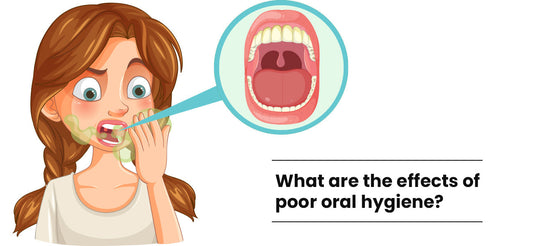When was the last time you thought about your oral health beyond just brushing and flossing? While many people see dental care as just a way to maintain a bright smile, the truth is that oral health and overall health are deeply connected. Your mouth is often the first place where signs of systemic health issues appear.
If you have ever wondered whether dental health affects overall health, the answer is yes!
Poor oral hygiene doesn’t just lead to cavities and bad breath, it can indicate or even contribute to serious health conditions like heart disease, diabetes, and respiratory issues.
Let us break down the relationship between oral health and hygiene and understand why maintaining good oral hygiene is crucial for well-being.
How Does Oral Health and Overall Health Are Connected?
Your mouth is the gateway to your body. The health of your gums, teeth, and tongue can reflect the condition of your overall well-being. Bacteria, inflammation, and infections in the mouth don’t just stay there; they can travel to other parts of the body, leading to broader health issues.
Key ways oral health and overall health are linked include(1):
• Bacteria in the Mouth Can Spread: If not controlled with good oral hygiene, harmful bacteria from the mouth can enter the bloodstream, affecting vital organs.
• Inflammation in the Gums Can Trigger Chronic Disease: Gum disease (periodontitis) is linked to chronic inflammation, which is a major contributor to conditions like diabetes and heart disease.
• The Mouth Shows Early Signs of Disease: Many systemic diseases first manifest as symptoms in the mouth, such as swollen gums, mouth sores, or bad breath.
This makes oral health and hygiene a key factor in overall disease prevention.
Common Health Conditions Linked to Poor Oral Hygiene
Neglecting oral health and hygiene does more than cause dental problems, it can be an early warning sign of serious health issues. Here is how poor oral hygiene is connected to major health conditions:
1. Heart Disease and Stroke
Studies suggest that dental health affects overall health, particularly heart health. People with gum disease are at a higher risk of heart disease and stroke due to increased inflammation and bacterial infections entering the bloodstream.
Bacteria from the gums can travel to the arteries, leading to plaque buildup, which narrows blood vessels and increases the risk of heart attacks and strokes(2).
• Prevention Tip:
Brush and floss regularly, and schedule dental check-ups to prevent gum infections that could impact your heart.
2. Diabetes
Diabetes and oral health are closely linked. High blood sugar levels create an environment where bacteria thrive, increasing the risk of gum infections. At the same time, untreated gum disease can make it harder to control blood sugar levels, worsening diabetes symptoms(3).
Persistent gum infections, slow-healing mouth sores, and dry mouth can be indicators of diabetes.
• Prevention Tip:
Maintain stable blood sugar levels, brush twice a day, and use an antibacterial mouthwash.
3. Respiratory Issues
Poor oral hygiene can contribute to respiratory problems like pneumonia and chronic obstructive pulmonary disease (COPD)(4). Bacteria from infected gums and teeth can be inhaled into the lungs, leading to infections.
• Prevention Tip:
Regular dental cleanings help remove harmful bacteria and reduce the risk of respiratory infections.
4. Digestive Issues
Digestion begins in the mouth, and oral health and overall health are connected through proper chewing and saliva production. Poor oral hygiene can lead to difficulty chewing food properly, affecting digestion and nutrient absorption(5).
• Prevention Tip:
Chew food thoroughly, stay hydrated, and maintain good oral hygiene to aid digestion.
5. Pregnancy Complications
Pregnant women with poor oral hygiene are at higher risk for complications such as premature birth and low birth weight. Gum disease during pregnancy can lead to inflammation that affects the developing baby(6).
• Prevention Tip:
Expecting mothers should maintain oral health and hygiene through regular dental visits and proper oral care.
Signs That Indicate Poor Oral Health
How do you know if your oral health is affecting your overall health? Watch out for these signs(7):
• Bleeding or swollen gums:
This could indicate gingivitis or periodontitis, which are linked to inflammation throughout the body.
• Persistent bad breath:
Chronic bad breath may be a sign of an underlying infection.
• Tooth sensitivity or pain:
This could indicate decay or gum recession, which can worsen without treatment.
If you notice these symptoms, it is time to improve oral health with proper hygiene and dental care.
Tips to Improve Oral Health for Better Overall Well-Being
Taking care of your teeth and gums does more than give you a great smile, it protects your overall health. Here are simple yet effective ways to improve oral health:
1. Brush and Floss Daily
• Brush twice a day using fluoride toothpaste to remove plaque and bacteria.
• Floss daily to clean between teeth and prevent gum disease.
2. Use an Antibacterial Mouthwash
Mouthwash helps kill bacteria and reduces plaque buildup, promoting good oral hygiene.
3. Eat a Nutrient-Rich Diet
Foods high in calcium, vitamin D, and antioxidants strengthen teeth and gums. Include:
• Leafy greens (for calcium and vitamin C)
• Dairy products (for strong enamel)
• Nuts and seeds (for healthy fats that fight inflammation)
4. Stay Hydrated
Water washes away food particles and bacteria, preventing dry mouth and bad breath.
5. Avoid Tobacco and Excessive Sugar
Smoking and excessive sugar consumption lead to poor oral hygiene and increase the risk of cavities and gum disease(8.9).
6. Schedule Regular Dental Check-Ups
Visiting the dentist every six months allows early detection of oral health issues, preventing complications that could affect overall health.
7. Manage Stress Levels
High stress can lead to teeth grinding (bruxism) and gum inflammation(10). Practice stress-relief techniques like meditation or exercise to protect your teeth and gums.
Your oral health is incredibly vital for your overall health. Whether it is gum disease linking to heart issues or oral infections affecting digestion, it’s clear that dental health affects overall health in significant ways.
By maintaining good oral hygiene, eating the right foods, and scheduling regular dental visits, you can improve oral health and prevent systemic health issues. Don’t overlook the power of oral care, it is one of the simplest yet most effective steps toward a healthier body.
So, the next time you brush and floss, remember: you’re not just taking care of your teeth, you are investing in your long-term well-being!
References
- Li X, Kolltveit KM, Tronstad L, Olsen I. Systemic diseases caused by oral infection. Clin Microbiol Rev. 2000 Oct;13(4):547-58. doi: 10.1128/CMR.13.4.547. PMID: 11023956; PMCID: PMC88948.
- Hopkins, S., Gajagowni, S., Qadeer, Y., Wang, Z., Virani, S. S., Meurman, J. H., & Krittanawong, C. (2023). Oral health and cardiovascular disease. The American Journal of Medicine, 137(4), 304–307. https://doi.org/10.1016/j.amjmed.2023.11.022
- Leite, R. S., Marlow, N. M., Fernandes, J. K., & Hermayer, K. (2013). Oral health and type 2 diabetes. The American Journal of the Medical Sciences, 345(4), 271–273. https://doi.org/10.1097/maj.0b013e31828bdedf
- Scannapieco FA. Role of oral bacteria in respiratory infection. J Periodontol. 1999 Jul;70(7):793-802. doi: 10.1902/jop.1999.70.7.793. PMID: 10440642.
- Madsen, C. (2021). The role of oral health in gastrointestinal malignancies. Journal of Gastrointestinal Oncology, 12(S2), S311–S315. https://doi.org/10.21037/jgo.2020.02.03
- Yenen, Z., & Ataçağ, T. (2019). Oral care in pregnancy. Journal of the Turkish-German Gynecological Association, 20(4), 264–268. https://doi.org/10.4274/jtgga.galenos.2018.2018.0139
- Tadin, A., Guberina, R. P., Domazet, J., & Gavic, L. (2022). Oral Hygiene Practices and Oral Health Knowledge among Students in Split, Croatia. Healthcare, 10(2), 406. https://doi.org/10.3390/healthcare10020406
- Gajendra, S., McIntosh, S., & Ghosh, S. (2023). Effects of tobacco product use on oral health and the role of oral healthcare providers in cessation: A narrative review. Tobacco Induced Diseases, 21(January), 1–16. https://doi.org/10.18332/tid/157203
- Feldens, C. A., Pinheiro, L. L., Cury, J. A., Mendonça, F., Groisman, M., Costa, R. a. H., Pereira, H. C., & Vieira, A. R. (2022). Added sugar and oral health: A position paper of the Brazilian Academy of Dentistry. Frontiers in Oral Health, 3. https://doi.org/10.3389/froh.2022.869112
- Chemelo, V. D. S., De Sousa Né, Y. G., Frazão, D. R., De Souza-Rodrigues, R. D., Fagundes, N. C. F., Magno, M. B., Da Silva, C. M. T., Maia, L. C., & Lima, R. R. (2020). Is there association between stress and bruxism? A Systematic Review and Meta-Analysis. Frontiers in Neurology, 11. https://doi.org/10.3389/fneur.2020.590779






